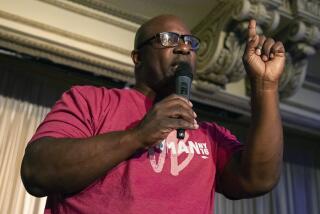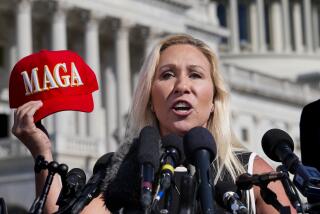N.Y. Moderates Key to Clinton Fate
- Share via
WASHINGTON — With a cliffhanger House impeachment vote looming, it is the independent-minded Republicans of New York state, more than any other congressional delegation, who are poised to cast the potential deciding votes on President Clinton’s fate.
The bulky delegations of California and Texas by and large already have declared their intentions--for the most part toeing the party line.
But in New York--among the most Clinton-friendly states in the nation in 1992 and 1996--half a dozen Republicans remain undeclared.
And with the outcome of Thursday’s vote too close to call, they are being bombarded by conflicting messages from constituents and party leaders.
Back home, Gov. George Pataki, New York City Mayor Rudolph W. Giuliani and outgoing Sen. Alfonse M. D’Amato are urging them to vote no. But in the House, their leadership is pressing them to vote yes.
The dilemma facing Reps. Sherwood E. Boehlert, Michael P. Forbes, Benjamin A. Gilman, Sue W. Kelly, Rick Lazio and John M. McHugh is excruciating for another reason: All represent districts--from Long Island to the Canadian border--that Clinton carried in 1996.
That makes a pro-impeachment vote tantamount to undoing the wishes of a majority of their constituents. But an anti-impeachment vote also could prove costly, as another moderate Republican congressman from New York discovered.
Just hours after Amo Houghton declared his intention last week to vote against impeachment, a hard-line conservative announced that he would challenge Houghton for the GOP nomination in 2000.
Two other moderate New York Republicans, Peter T. King and Jack Quinn, have announced that they will oppose impeachment Thursday.
“I wonder if there’s something in the water up there,” mused Judiciary Committee Chairman Henry J. Hyde (R-Ill.).
In fact, these centrists from the Empire State--part of a 31-member delegation--are the endangered inheritors of the once-dominant Rockefeller wing of the GOP in an era when the party’s power base has shifted to the South and the Sunbelt.
The upcoming impeachment vote only highlights their isolation--and the probability that they will not vote as a bloc, analysts said.
“I’m going to be surprised if they all end up in the same camp,” said Larry Sabato, a University of Virginia political scientist. “Just because they are all from New York, and by orientation moderates, doesn’t mean they will necessarily vote alike on this issue.”
Indeed, James T. Walsh, another New York moderate, announced Monday that he would vote for impeachment.
“There is no doubt in my mind that the president lied under oath in both the Paula [Corbin] Jones case and the subsequent grand jury proceeding,” Walsh said.
“I also believe beyond a reasonable doubt that he obstructed justice by coaching, indeed suborning, potential witnesses in the grand jury proceeding,” said Walsh, who was among several previously undecided Republicans to come out for impeachment Monday.
Walsh, a maverick lawmaker who often has bucked his party on key votes, was one of the undecideds that both the pro- and anti-impeachment camps had regarded as critical.
Before he jumped into the impeachment camp Monday, Walsh had received several calls from White House aides on the issue. Roll Call, the Capitol Hill newspaper, wrote: “If Walsh opposes impeachment, expect it to fail.”
Walsh acknowledged that the decision was not an easy one, despite facts that he considered clear-cut.
“It was difficult because I had to weigh the prospect of an unseemly public trial of the president against the knowledge that the president would be getting away with perjury and the resulting damage to our criminal justice system.”
Congressional analyst Norman Ornstein said that other undecided New Yorkers may well follow Walsh’s lead.
While the views of Pataki, Giuliani and D’Amato have fostered “a climate that provides a strong reason to vote against impeachment,” Ornstein said, the moderates are likely to regard the vote in narrower, more self-centered, terms.
“The next election may be almost two years off. But even if you’re from a moderate district, the reality is, who’s going to have a longer memory--the [pro-impeachment] primary activists or the broader voters? It’s the former,” said Ornstein, a resident scholar at the American Enterprise Institute, a conservative think-tank here.
With the moment of truth rapidly approaching and the glare of the spotlight increasing, the undecided moderates on Monday retreated behind a veil of silence even as the volume of incoming telephone calls and E-mails to their offices surged dramatically.
New Yorkers are not the only GOP moderates buffeted by the impeachment crosscurrents.
Most notably, Rep. Christopher Shays of Connecticut said Monday that he may reconsider his anti-impeachment position and asked to meet in person with the president.
“If I had to vote today, I would vote against impeachment,” Shays said. “I don’t have the same level of conviction I had a week ago. . . . I’m willing to reconsider this issue, especially in light of the fact that I’m having a community meeting” tonight.
Shays said he intended to convey his constituents’ concerns to the president.
More to Read
Get the L.A. Times Politics newsletter
Deeply reported insights into legislation, politics and policy from Sacramento, Washington and beyond. In your inbox twice per week.
You may occasionally receive promotional content from the Los Angeles Times.










